The Marcos family / Philippines
It’s all relative
A country of 7,000 islands and almost as many contradictions, the Philippines is living out its past and embracing its future through the trials of one powerful dynasty: the incomparable Marcos family.
Under swaying palms on a tranquil out-island beach, the Philippines has never looked so good: gracious, running smoothly and buoyed by new economic growth. Even the country’s Muslim guerrillas want peace. Then again, it is still wise to bring a private army in places. And in Manila, when paralysed in fuming traffic between monster malls and squalid slums, thoughts turn to Dante’s Inferno.
The Philippines, 7,000 islands of complex contradiction, has eluded definition since Americans seized it from Spain in 1898 and then set it free after the Second World War. Filipinos, the old line goes, spent four centuries in a Spanish convent, five years in a Japanese prison camp and 65 years in Hollywood. Today, hardly any place on Earth outdoes the Philippines for extremes. It roared to 7.1 per cent third-quarter growth last year while tired Asian tigers barely managed a growl. The rest of the world struggled through 2012; its economy rose by more than 6 per cent for the year. But that rests heavily on unpredictable cash flows from Filipino service workers abroad and property splurges. As some grow yet richer, life gets all the harder for the country’s other 99 per cent. Despite some progress at curbing pockets of power, entrenched oligarchs run fiefdoms through patronage and fear.
A mere €45 hires a two-man motorbike hit squad to blot out an enemy. This is still the Philippines. Godfather-warlords continue to hold sway throughout the country. Public sentiment is diffuse among 100 million people of varied origin on a string of islands that add up to a landmass as big as Italy. In the end, old clans and familiar names keep muscling to the fore. No name is as old and familiar as Marcos. From Imelda’s high-floor condo in Ayala at the edge of Manila, chock-full of old artworks and high-heeled shoes, the view smacks of Wall Street superimposed on Beverly Hills. Private cops watch over golden youth at play. Near the sprawling squalor of Tondo, on the other side of Manila, regulars at one nightspot are known for shooting karaoke singers who croon “My Way” off key. “We Filipinos are so dumb and we have no memory,” says F Sionil José at his Solidaridad Bookstore in Manila’s old walls. “Frankie” José’s memory is fine at 88 and he is hardly dumb. His incisive essays and novels on Philippine foibles make him a perennial Nobel candidate. For anyone covering the Philippines in the 1970s, José was a bedrock source.

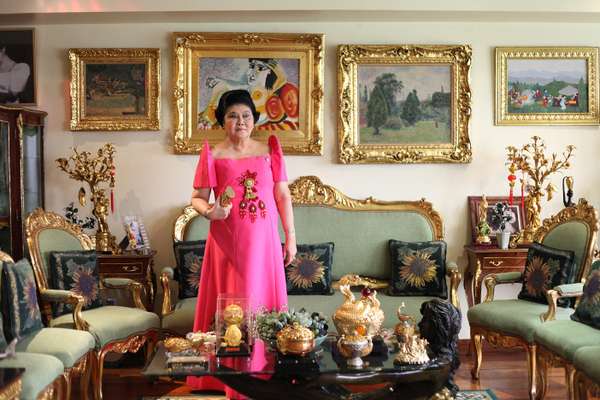
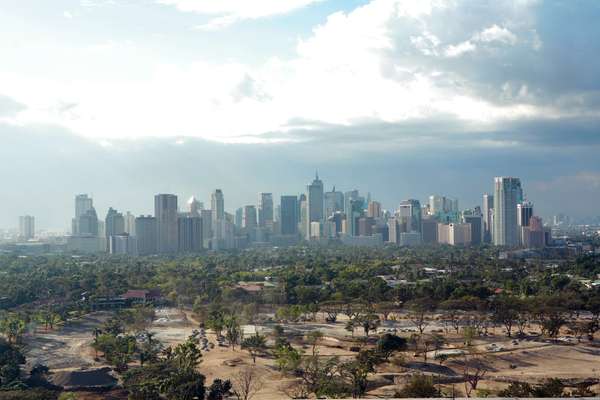
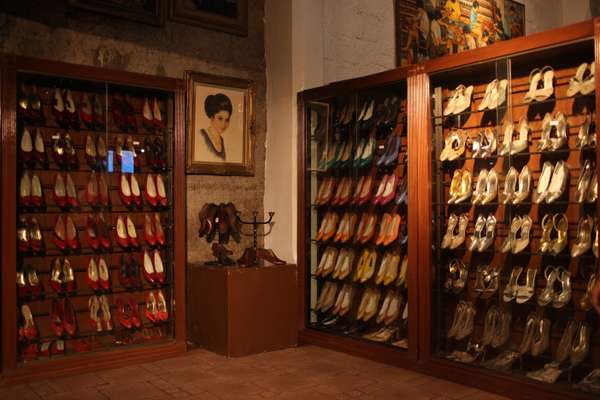
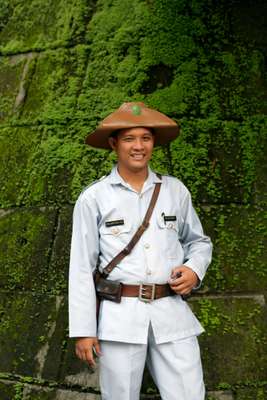
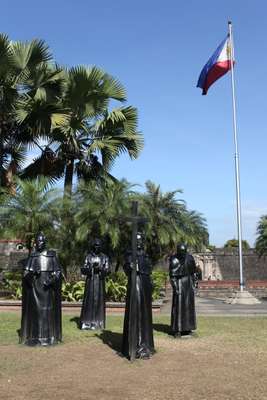
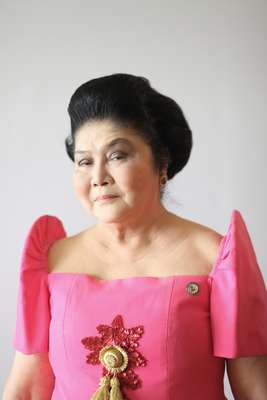
He was also a force behind the People Power movement that deposed Ferdinand Marcos in 1986 after 21 years in power. People Power surged up after Marcos’ old foe, Benigno Aquino Jr, was shot dead as he stepped from the plane that brought him back to Manila from exile. Although no one could prove that Marcos was responsible, he was forced to flee. Aquino’s widow, Cory, was elected to replace him. After a string of scandal-plagued successors, the Aquinos’ son, Benigno III – “Noynoy” – is now the president. Cory Aquino’s presidency accomplished little, José says, but Noynoy is making headway against corruption and cronyism. In October, his government made peace with the Moro Islamic Liberation Front (milf), which has terrorised parts of the southern islands for 40 years. The economic boom helps. “Things are looking bright but there is no trickle effect yet,” says José. “It’s very, very important to transfer this wealth to industry and agricultural production. Nothing can happen until rich Filipinos have not only a change of mind but also a change of heart.” A good look around reveals an immutable past that shapes a troubling future. Young people desert the fields but find few jobs in the cities. The country that developed the Green Revolution – which transformed food production across the world – now imports 10 per cent of its rice, and too many boats and dynamite blasts have depleted rich fisheries. For decades the US naval base at Subic Bay and the Clark Air Force Base assured Philippine security. When they were both forced to close in 1992, only token national armed forces took their place. Today, as China pushes the limits in disputed waters, Washington is scrambling to build what strategists call “a minimum credible defence”. That includes a few outdated hand-me-down vessels and long-range training programmes. Then, last but not least, there is the Philippines’ perennial curse of revolving door politics.
Imelda Marcos came home from Hawaii in 1991 after neither American nor Philippine courts could trace the estimated €8bn her husband was accused of plundering. She was soundly defeated in a bid for the presidency but, at 83, she is a member of Congress; her daughter, Imee, is governor of Ilocos Norte. In fact, Imelda may yet return to Malacanang Palace: her son Bongbong – Senator Ferdinand Marcos Jr – is a likely candidate for president in 2016. Today, Imelda is hardly chastened, nor is she repentant. She recounts her triumphs as governor of Metro Manila and as a jet-powered First Lady and diplomat at large. “I have been blasted, ridiculed and persecuted for so many years,” she says. “I am still standing. People compared me to the greediest people in the world, like Genghis Khan.” Then she adds, with a merry laugh, “I have mixed feelings about that. Genghis Khan only conquered east and west, he only faced tribes and hordes. I was facing superpowers, supermen, in the whole world.” Names drop by the dozens: Mao, De Gaulle, Gaddafi, Saddam, Queen Elizabeth, Castro, Carter, Nixon, Big Bush. In Madrid, she says, Francisco Franco left his sickbed in his pyjamas to see her. One wall of her posh apartment is papered in New York newspaper front pages trumpeting her court victories.
By Imelda’s count, she won 901 cases. It’s complicated. But her husband died a free man and she brought him home to Ilocos Norte where he reclines, in waxed effigy, in a very fancy room. When the subject switches to shoes Imelda claps her hands gaily and returns, unexpectedly, to Genghis Khan. “He said the difference between peasants and nobility is shoes,” she explains. “That’s why he was wearing golden shoes. I’m not up to that. I think I have more shoes now than before. People say, ‘Poor Imelda, she was robbed of her shoes,’ and they send me more. What size? At this point it doesn’t matter.” Imelda’s extravagant shopping sprees were legendary. When she fled, she says, “they came looking in my closet for skeletons and only found my shoes”. In fact, she continues, most of her shoes were from a pet project, an artisan village famed for its leatherwork. With her help their earnings skyrocketed. Imelda produces a plaque bearing an engraved high-heeled pump, presented to her by Philippine shoemakers. Her most fancy footwear is in a museum downtown.
Bongbong Marcos chuckles softly at the mention of Imelda and deftly changes the subject. He is a handsome and youthful 55, softly spoken, with an easy smile. A cluster of family portraits covers a corner table in his senate office. “When I saw what my father went through in 1986 I didn’t want anything to do with politics,” he says. “I wanted to make money.” After high marks at the London School of Economics he earned an mba at the University of Pennsylvania’s Wharton School. But, he says, he realised that politics was in his blood. “It’s the family business.” The elder Marcos, who swept into power as a beloved war hero with a sharp business mind, ran the Philippines with an open hand: the country’s lively press barracked him incessantly and congressmen spoke their minds. However, he also made sure that he repressed any political threat with an iron fist. This being the Philippines, how Ferdinand is remembered depends on who you ask. When I tell my driver I am seeing the senator, he beams. “My mother used to say President Marcos was seven times smarter than Reagan.”
It’s no surprise that my driver is from Ilocos, the same region as the Marcos family. Bongbong laughs off questions about whether he would run for president. In any case, he says, for better or worse he is a different man from his father. He takes a pragmatic economist’s approach. He believes the country needs a trained workforce committed to producing things. He worries that the Philippine boom imperils the future, placing too much focus on consumer splurge rather than bedrock industry, agribusiness and farming. Looking from his balcony in modern-day Manila you can see his point. Beyond the senate, on reclaimed land, the vast Mall of Asia comprises 800 shops and 300 places to ingest calories. His home is one of many such apartments, relatively modest considering the more lavish complexes in the suburbs.
The extremes of Philippine society – urban consumer bingeing and dirt-poor backwoods subsistence – took on stark clarity when milf’s 200 Islamic guerrillas came straight from the jungle to make peace in Manila. They were lodged at the Sofitel Philippine Plaza, an opulent palace of soaring glass and steel. Beautiful young hostesses in revealing local dress led them into the vast marbled lobby past an Italian sports convertible on display. In a more historic setting, Manila’s Spanish ramparts feature plaques bearing portraits in relief of Philippine presidents going back to 1898. One is Diosdado Macapagal, who held office from 1961 to 1965. Another is his daughter, Gloria, president from 2001 to 2010, now under hospital guard for a mysterious neck condition and awaiting trial for corruption. Two are Aquinos. Space is left for another, maybe a second Marcos.
For all the troubling signs, Philippine extremes show a promising upside: a fresh generation that’s wired to the world and ready for something better. Near the ramparts I find four students taking in the evening air. Three want to be teachers. Lovely Del Rosario, 18, plans to study law. She is convinced she could make a batch of babies and also help reform the Philippines. “No guts, no glory,” she says with a laugh. “We’ve got to get rid of these dynasties, the cronies and the corruption.” John Denver Gallo (his parents must have been on a Rocky Mountain high), 18, nods. He is hopeful because so many of his friends want something better. A new generation looks outward, he says, linked by texts and tweets. Ideas spread fast; people who were excluded before have a chance at command. But Arnold Punzal, 19, who spent his childhood in the rough slum of Tondo, listens thoughtfully. I ask if his generation could break the old patterns. “I think not, sir,” he says. “But maybe we can make a change.”
The Marcos family isn’t the only political dynasty pinning its hopes on a new generation. See the top of the Affairs briefing pages for more families with a flair for politics.
The Marcos family CV
1929 Imelda Marcos (nee Romuáldez) is born
1952 Earns bachelor degree in education from St Paul University Manila
1953 Her looks earn her the title “Muse of Manila” from the capital’s mayor
1954 Meets future husband, congressman Ferdinand E Marcos. The pair marry after a romance lasting just 11 days
1957 Ferdinand Marcos Junior, known as Bongbong, is born
1965 Imelda becomes First Lady
1972 Martial law declared and sweeping parliamentary reforms abolish the country’s constitution. Tension mounts and Imelda is stabbed in a botched assassination attempt
1978 Imelda is elected to congress
1980 Bongbong’s political career begins: becomes vice-governor of Ilocos Norte
1983 Opposition leader Beningo Aquino assassinated
1986 Ferdinand Marcos is toppled by popular revolution. The pair flee to Hawaii leaving 1,220 pairs of her shoes as a relic of the excesses of their regime
1989 Ferdinand dies in exile
1991 Imelda returns to the Philippines
1992 Imelda has an unsuccessful runs for presidency; Bongbong becomes a congressman
1995 Imelda wins election to the House of Representatives
1998 Declares intention to run for president but withdraws two months later
2006 Launches fashion line: the Imelda Collection
2010 Bongbong elected to the senate
2012 Imelda, 83, announces that she will seek a second term in congress
The other dynasty: the Aquino family
President Benigno Aquino III’s great grandfather, General Servillano Aquino y Aguilar, fought the Japanese, then the Americans, for independence. His grandfather, Benigno Aquino Sr, was senate speaker until the Second World War. But the Aquinos’ monumental family feud began in the 1960s when his father opposed Ferdinand Marcos.
Senator Benigno Aquino Jr was arrested in 1973 when Marcos declared martial law. After seven years in prison he suffered a heart attack and went to the US. He decided to return in 1983 but gunmen shot him dead as he alighted from the aircraft. That catapulted his widow, Corazon, into politics. Her People Power movement sent Marcos and his family into exile.
Corazon was elected president in 1986. She never proved, as many suspected, that Marcos ordered her husband assassinated. When she left office in 1992, Imelda Marcos, the deposed dictator’s widow, returned to Manila and ran a losing race to replace her. Corazon died of cancer in 2009. A year later, her son was president. Benigno Aquino III’s term finishes in 2016. A possible replacement is in the senate: Ferdinand Marcos Jr.


